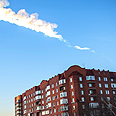
Russian Meteorite
Photo: AFP
Scientists said Monday they had discovered fragments of the meteor that astoundingly plunged over Russia’s Ural Mountains; creating a shockwave that injured 1,200 people and damaging thousands of homes.
The giant slice of space rock dashed over the city of Chelyabinsk in central Russia on Friday equating to the force of 30 of the nuclear bombs dropped on the Japan's Hiroshima during World War II.
Related Stories:
It exploded a few dozen miles above Earth but its pieces are believed to have scattered over wide expanses of the industrial region.
Recovery workers, who thoroughly examined a small lake where at least some of the fragments were believed to have fallen, were incapable of discovering anything in their initial search.
But members of the Russian Academy of Sciences, who conducted chemical tests on some rare rocks on Sunday, said the pieces had come from outer space.
“We confirm that the particles of a substance found by our expedition near Lake Chebarkul really do have the composition of a meteorite,” RIA Novsosti quoted Russian Academy of Sciences member Viktor Grokhovsky as saying late Sunday.
The Urals Federal University separately posted a statement on its website on Monday that featured a photograph of a person holding a tiny piece of porous black rock in his hand.
Meteorite Chebarkul
“This meteorite belongs to the class of regular chondrites,” the university statement said.Grokhovsky said the rock in question was composed in part of metallic iron as well as chrysolite and sulfite.
Its iron content was estimated at 10 percent.
“Most likely, (the find) will be called Meteorite Chebarkul,” the Russian university said.
The meteor’s shockwave blew out the windows of about 5,000 buildings, leaving 40 people – including three children –recovering in the hospital on Sunday with cuts and more serious injuries.
Some 24,000 rescue workers and volunteers spent their weekend replacing smashed windows in time for the resumption of school and work.
But the impalpable meteorites – meteor fragments that have hit Earth – have sparked an interest as well.
Russian space debris seekers have posted ads on websites offering as much as 300,000 rubles ($10,000) for an original portion of the latest space rock to hit the planet from up above.
Chelyabinsk authorities have cordoned off the area surrounding the lake; preventing media or independent researchers hunting for meteorites from nearing the hole in the thick sheet of ice.
The lake “is still cordoned off, but it is quite clear that a meteorite is buried there,” the scientist said.
- Receive Ynetnews updates
directly to your desktop















